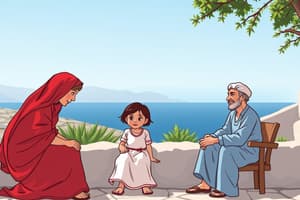Podcast
Questions and Answers
Ποιο από τα παρακάτω δεν αποτελεί κομμάτι της ελληνικής κληρονομιάς όπως περιγράφεται στο κείμενο;
Ποιο από τα παρακάτω δεν αποτελεί κομμάτι της ελληνικής κληρονομιάς όπως περιγράφεται στο κείμενο;
- Η φιλοσοφία
- Η αρχαία δραματουργία
- Το παστίτσιο (correct)
- Η ελληνική μυθολογία
Ποιο αρχαίο σύστημα αναφέρεται ότι ανέπτυξαν οι αρχαίοι Έλληνες σύμφωνα με το κείμενο;
Ποιο αρχαίο σύστημα αναφέρεται ότι ανέπτυξαν οι αρχαίοι Έλληνες σύμφωνα με το κείμενο;
- Πολιτικό σύστημα (correct)
- Περιβαλλοντικό σύστημα
- Οικονομικό σύστημα
- Κοινωνικό σύστημα
Ποιος από τους παρακάτω δεν ανήκε στους μυθικούς χαρακτήρες της ελληνικής μυθολογίας, όπως αναφέρεται στο κείμενο;
Ποιος από τους παρακάτω δεν ανήκε στους μυθικούς χαρακτήρες της ελληνικής μυθολογίας, όπως αναφέρεται στο κείμενο;
- Οδυσσέας
- Δίας
- Περσέφονη
- Αλέξης (correct)
Σύμφωνα με το κείμενο, πώς ονομάζεται η παράδοση του να κάθεται κάποιος έξω από ένα καφέ και να απολαμβάνει το καλοκαιρινό αέρι;
Σύμφωνα με το κείμενο, πώς ονομάζεται η παράδοση του να κάθεται κάποιος έξω από ένα καφέ και να απολαμβάνει το καλοκαιρινό αέρι;
Πώς χαρακτηρίζεται η αγάπη των αρχαίων Ελλήνων για τη ζωή στη φύση, σύμφωνα με το κείμενο;
Πώς χαρακτηρίζεται η αγάπη των αρχαίων Ελλήνων για τη ζωή στη φύση, σύμφωνα με το κείμενο;
Flashcards are hidden until you start studying
Study Notes
Greek Culture and Its Components
In the rich tapestry of human civilization, the Greek world has provided an enduring and profound influence. Here, we'll explore the facets of Greek culture, examining its language, cuisine, arts, history, and mythology.
Ελληνική γλώσσα (Greek Language)
The Greek language, with its 3,000-year history, is one of the oldest continuously spoken languages in the world. It has an extensive lexicon, a complex system of grammar, and a rich literary tradition. Greek exists in two primary forms: Modern Greek and Ancient Greek. Modern Greek, the language of everyday life, is the official language in Greece and Cyprus. Ancient Greek, which served as the lingua franca of the classical Greek world, is still studied today for its philosophical, historical, and literary significance.
Ελληνική γαστρονομία (Greek Cuisine)
Greek cuisine is famed for its simplicity, freshness, and flavors. Common ingredients include olive oil, lemon, garlic, and herbs like oregano and thyme. Many dishes are rooted in ancient traditions, such as olives, feta, and honey. Some popular dishes include moussaka, souvlaki, dolmades, tiropita, and saganaki. Greek cuisine also features a wide variety of seafood dishes, highlighting the Mediterranean's abundance of fresh fish and seafood.
Ελληνικός πολιτισμός (Greek Culture)
Greek culture is marked by its deep connection to the arts, philosophy, and the outdoors. The ancient Greeks left a lasting legacy in the fields of drama, poetry, philosophy, and architecture. Notably, the Parthenon and other buildings adorned with famous statues and sculptures attest to this rich artistic tradition. The Greek love of living outdoors, as evident in the summer tradition of "katikí" (sitting outdoors at a local café), is another fundamental aspect of Greek culture.
Ελληνική ιστορία (Greek History)
Throughout its history, Greece has faced numerous challenges, yet its resilience has been an enduring source of inspiration. The ancient Greeks developed sophisticated political systems, advanced philosophy, and practiced democracy long before the term existed. The rise of the city-state, or polis, gave birth to critical innovations and ideas that have shaped Western civilization. More recently, Greece has experienced periods of turbulence and triumph, from the rise and fall of the Byzantine Empire to its current role as a member of the European Union.
Ελληνική μυθολογία (Greek Mythology)
Greek mythology, with its rich and colorful tales, has fascinated people for thousands of years. These myths, which often intertwine with history, provide a vivid account of the ancient Greeks' cosmology, values, and beliefs. Mythical figures like Zeus, Athena, and Heracles, and epic tales such as the Iliad and the Odyssey, endure as timeless stories.
Greek culture, with its roots in the ancient world, continues to inspire, influence, and inform civilization today. By exploring its language, cuisine, arts, history, and mythology, one can better understand the cultural heritage of Greece and its indelible imprint on the world.
Studying That Suits You
Use AI to generate personalized quizzes and flashcards to suit your learning preferences.




